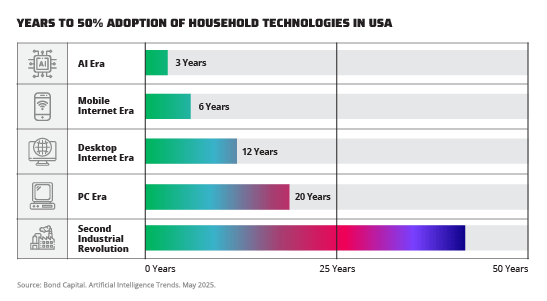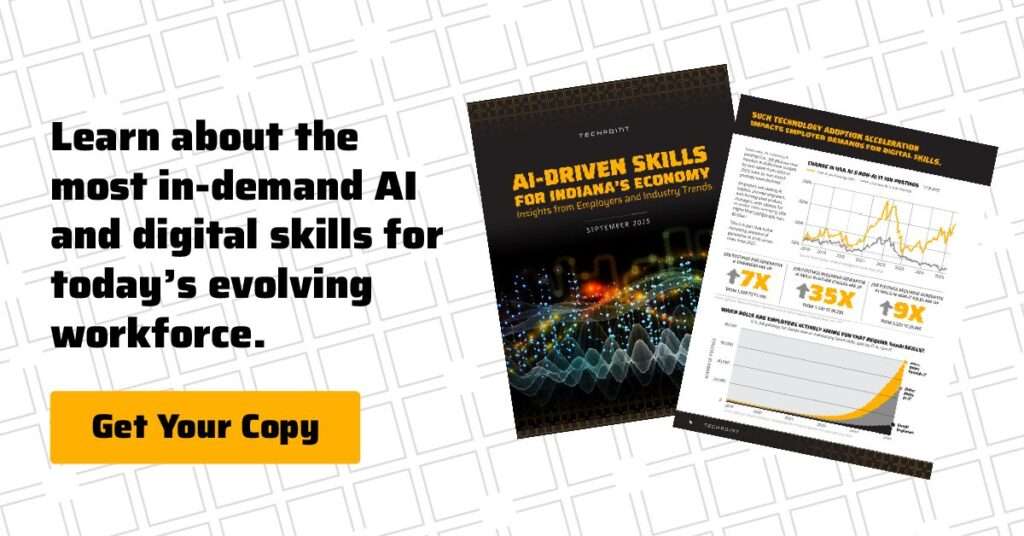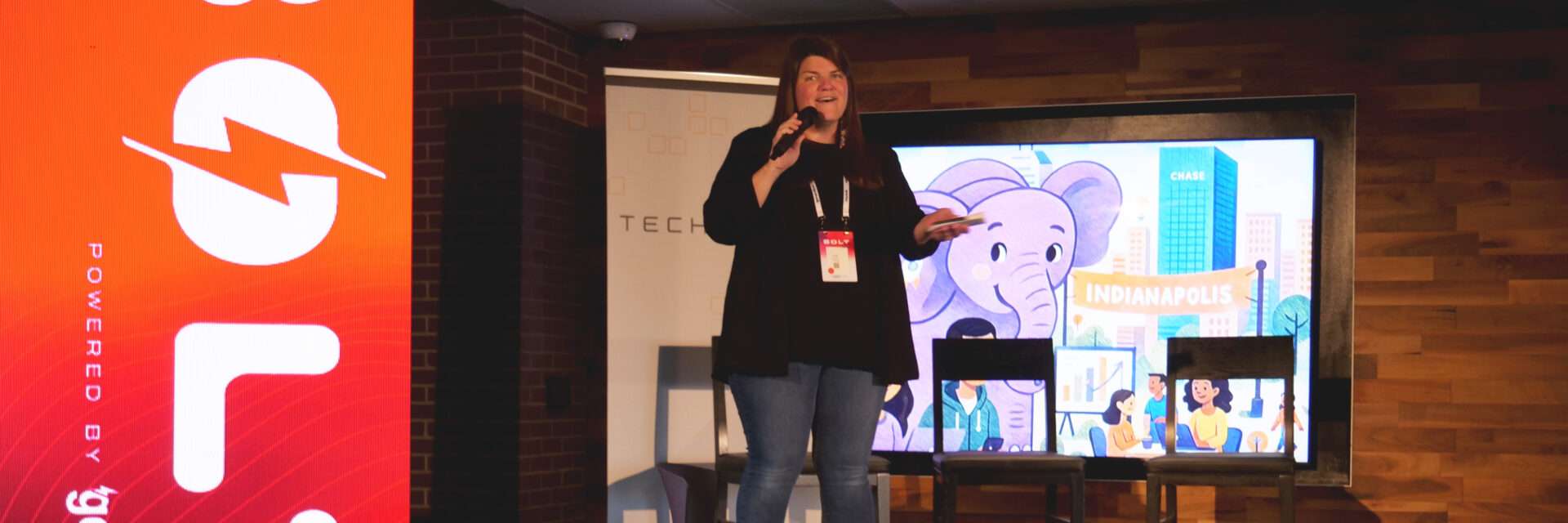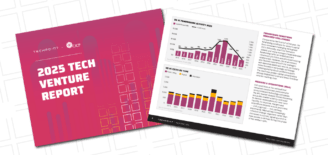How Indiana Can Lead in the Age of AI: Insights from TechPoint’s AI Workforce Report
At last week’s BOLT Conference, powered by gener8tor, TechPoint Vice President of Talent Sally Reasoner shared findings from our recent report, AI-Driven Skills for Indiana’s Economy, which explores how artificial intelligence is reshaping Indiana’s workforce and industry landscape. This was part of our talent convening, Beyond AI: The Real Pressures Shaping Tech and How Talent & Education Can Keep Pace, presented by WGU.
Sally also shared insights from other recent studies to examine how Indiana’s employers, educators, and workforce developers can prepare for the opportunities (and challenges) ahead. Here’s a recap of her breakdown, along with additional highlights.
AI is No Longer Emerging, It’s Disrupting Every Industry, Job, and Classroom
The elephant in the room? Not only is artificial intelligence here to stay, it’s being adopted at a significantly faster rate than previous new technologies. The pace of change is accelerating—while mainframe transitions took decades, Gen AI adoption has happened in a matter of months.
In just three years, over 50% of households in the United States have adopted AI, compared to a longer adoption curve with previous advancements.

Other key takeaways:
- Tech employers are in all sectors: over 70% of the tech workforce in Indiana work in non-core tech sectors.
- Tech skills are powering industry transformations: over 90% of today’s jobs require digital skills. Almost all jobs are tech-enabled jobs.
- Tech skills demands from employers are rapidly changing: today is all about AI, but within the next 3-5 years it’s likely that these technologies will be so pervasive, it’s likely there will be another shift.
The line between “technical” and “non-technical” roles is disappearing.
From HR and marketing to operations and finance, nearly every job now touches AI in some way. The most competitive organizations will be those that equip their workforce to collaborate with AI, not compete against it.
AI literacy—the ability to evaluate, prompt, and apply these tools safely—is becoming as fundamental as digital literacy was a decade ago. Building that foundation across job functions is key to long-term competitiveness.
GenAI Adoption Varies Across Industries
AI adoption is accelerating across every industry, but readiness remains uneven.
Many organizations are experimenting with new tools, yet few have the strategies, structures, or skills in place to scale them responsibly. True readiness means empowering teams—not just with access to technology, but with the confidence and fluency to use it effectively.
That begins with culture. AI shouldn’t live in an R&D corner; it should inform how every team learns, decides, and delivers. One report shows a wide range in levels of generative AI implementation and adoption, varying across industries.

Additionally, there’s a significant impact on how it impacts organizations.

The Speed of Transformation is Unprecedented
2025 Lightcast data shows the average job has seen 32% of the necessary skills change in just three years, with AI driving more of this disruption than any other trend.

Employers are increasingly seeking AI-related skills outside traditional tech roles, with more job postings now asking for AI skills outside the traditional tech sector. Salaries for postings that mention AI skills are 28% higher than postings that do not, representing roughly $18,000 more per year.
Indiana employers are also prioritizing tech adoption, with a varying range of hurdles standing in the way of this goal.

Demands Are Rising For Work-Based Learning, But There Aren’t Enough Opportunities
Employers increasingly expect candidates to arrive with applied experience—internships, apprenticeships, or real-world projects—even for entry-level roles. Yet those experiences are still unevenly distributed. Why?
- Small and mid-sized companies often lack the structure or capacity to host interns.
- Educators say students want practical learning but struggle to find accessible, high-impact placements.
- Workers looking to reskill or pivot careers rarely have pathways to gain experience while maintaining income stability.
The result: a widening gap between the skills employers say they need and the experience candidates are able to get.
As you can see below, there are now fewer entry-level tech jobs available, when compared with even a few years ago.

Work-based learning is one of the clearest ways to bridge that gap. There is a high level of interest in work-based learning opportunities, but a significant shortage of available roles. When students, educators, and employers co-design opportunities — from sponsored internships like TechPoint’s Xtern program to project-based industry challenges like Xtern Challenge, everyone benefits. Employers build their future talent pipeline. Learners see how classroom knowledge translates to impact. And communities retain more homegrown talent ready to step into Indiana’s growing tech and digital roles.

But right now, the demand is outpacing supply. Scaling these experiences across sectors — especially for smaller employers and nontraditional learners — will be essential if Indiana wants to meet its digital skills and workforce goals.
Upskilling Is Outpacing Entry-Level Hiring
TechPoint’s 2025 employer survey of more than 100 Indiana stakeholders revealed a telling shift: companies are prioritizing upskilling their existing teams over hiring new graduates.

Employers are investing in technical literacy, digital fluency, and human skills that allow workers to adapt as technology changes. At the same time, demand for hands-on experience is climbing — while demand for new grads without applied experience is declining.
This creates both a challenge and an opportunity: education and workforce programs must evolve to deliver real-world, project-based learning that connects theory with application.
Why This Matters for Indiana
Indiana’s digital transformation isn’t happening in isolation. It’s part of a national race to align skills, innovation, and opportunity. But our state’s advantage lies in scale and community — the ability to bring employers, educators, and innovators together to move faster collectively.
As TechPoint’s mission emphasizes, advancing talent, innovation, and community requires not just new technology but new models of collaboration. The data is a call to action for Indiana’s tech ecosystem to lean in on partnerships that connect students, workers, and employers to meaningful, future-focused skills development.

Read More From TechPoint’s Talent Convening at BOLT
Key Takeaways from TechPoint’s Talent Panel at BOLT →
BOLT Breakout Discussions: What Indiana’s Tech and Education Leaders Are Saying →
More From TechPoint
Explore data, insights, and actionable frameworks in AI-Driven Skills for Indiana’s Economy →



